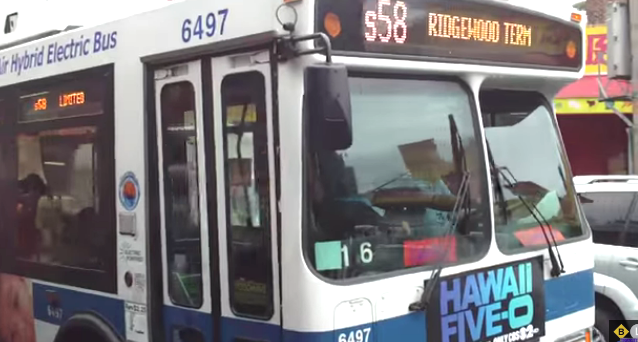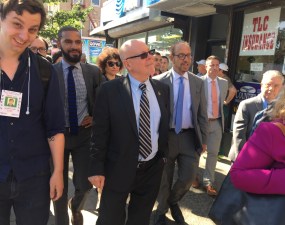Queens Board Votes Down Bus Lane for Parking
Ridgewood NIMBYs snub the transit-riding many in order to protect the car-owning few.

A Queens community board voted on Wednesday night against a proposed dedicated bus lane that would have helped 30,000 riders in order to save a few parking spaces.
Community Board 5 rejected the Department of Transportation’s plan for a part-time, south-bound lane along Fresh Pond Road in Ridgewood — overruling the board’s own Transportation Committee, which approved the lane from Bleeker Street to Putnam Avenue on June 18.
The DOT says the lane would help traffic flow along the route by consolidating several bus stops and retiming traffic signals. It also includes amenities for businesses, such as several loading zones. But it would also require the city to repurpose some curb space in the public right of way — which many drivers believe exists for the storage of their private property — for buses. To make up for that the city proposed adding two-hour metered parking on several side streets, including Grove and Palmetto.
For the board’s car-loving majority, the loss of parking and the new metered areas were the sticking points. Opponents also argued that a bus lane would hurt businesses whose patrons use cars or would force traffic to relocate. They had political cover: Council Member Robert Holden, who represents the area, wrote to DOT Commissioner Polly Trottenberg on June 9, demanding that she table the bus-lane plan for what he called “less drastic traffic-calming measures.”
“I’m on Myrtle Avenue, and this will force more cars onto the side streets,” said board member Fred Haller, who said the loss of residential parking on Fresh Pond Road, along with the addition of metered parking on the side streets, would cost car owners the ability to find parking spots.
Transportation Committee Chairman John Maier, who voted for the plan, tried to counter these notions — to no avail.
“Businesses have already closed because people can’t get down there,” Maier said.
Maier pointed to statistics that the Q58, which serves 30,000 commuters daily on that route, was among the slowest lines in Queens. “These buses need to serve people, and they can best do that by having access to dedicated lanes to get down to the Fresh Pond Depot and then head back toward Flushing,” he said.
Bus lanes are a proven way of promoting social equity and helping the environment, but car supporters on many community boards have opposed them. According to the Comptroller’s Office, lower-income and immigrant communities rely on bus service more than others. Bus commuters, on average, make $11,500 less annually than the average subway rider’s $40,000 annual income, according to the comptroller.
The board, which voted down DOT’s plan by a count of 28 to 6, approved — by the same margin — a motion calling on DOT to study alternatives. Of course, DOT can still make the changes regardless of the board’s recommendation, which is only advisory. But DOT tries to work with community boards as closely as possible.
Riders Alliance, a bus advocacy group, slammed the community board for its rejection.
“Fresh Pond Road needs a bus lane so 30,000 daily riders can get to their jobs, schools and local stores,” said Danny Pearlstein, the group’s policy & communications director. “Q58 service today is miserably slow and unreliable. At three miles an hour, many people can walk faster. Elected officials and the DOT must stand up for Fresh Pond Road riders and get cars out of the way to relieve bottlenecks.
“When cars and parking take priority, New Yorkers with disabilities or who travel with packages, groceries, or young children are left out, denied full inclusion in our communities,” Pearlstein added. “It’s past time that the millions in our city who rely on buses to commute to work, to shop and visit doctors get what we deserve on crowded streets.”
DOT said via a spokesman that it was disappointed by the CB5 vote on what it called a “critical fix to transit and congestion issues.”
“The fact remains that cars, buses and first responders currently crawl southbound during late afternoon and early evening rush hour between Bleecker Street and 67th Avenue,” the spokesman said. “Buses currently move at 3 miles per hour — that’s slower than the average person walks. DOT’s design for this critical corridor will make traveling faster for all users, while creating a net gain of metered parking and additional loading zones to support the vitality of local businesses. It’s a win for businesses and especially a win for the 30,000 daily bus riders using this route and countless motorists heading to this commercial corridor and local neighborhoods.”
The next CB 5 general meeting will be held on Sept. 18. CB 5 encompasses Ridgewood, Glendale, Middle Village, Maspeth, Fresh Pond, and Liberty Park.
— With Eve Kessler



